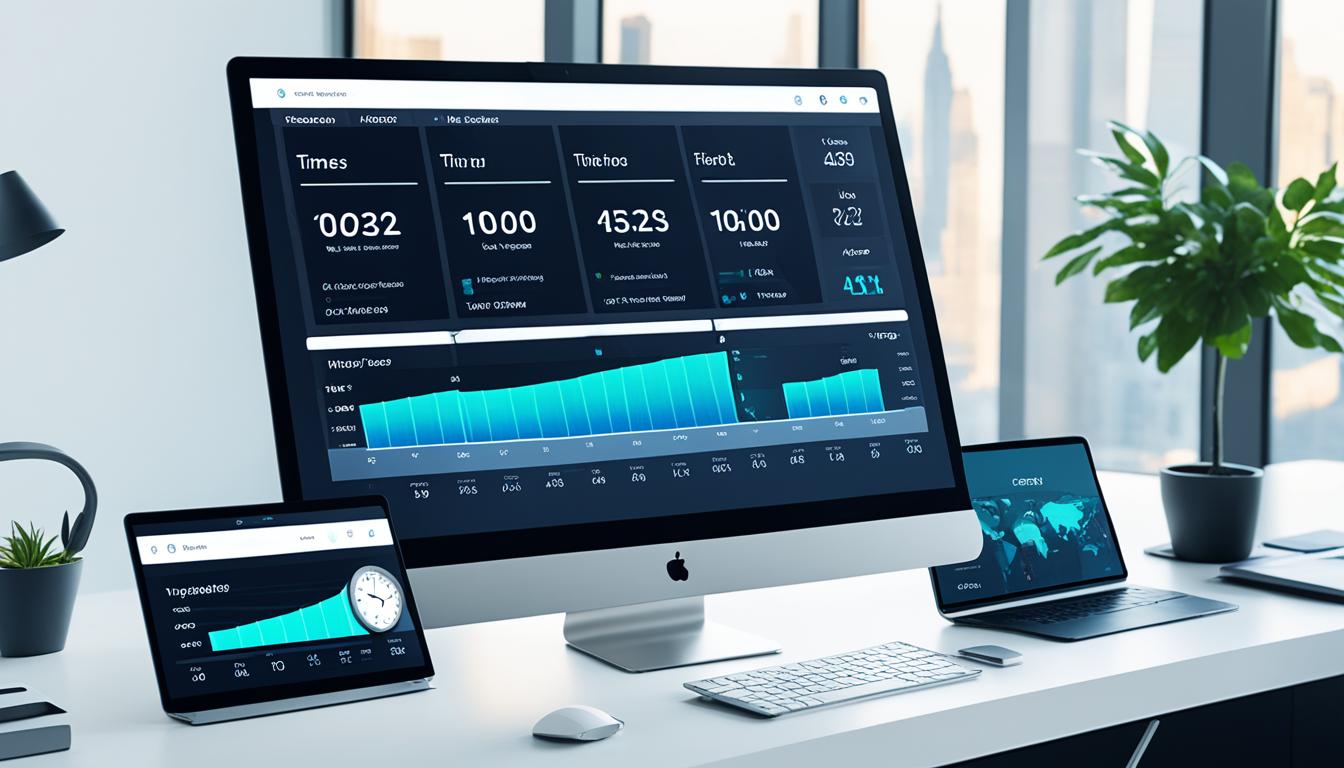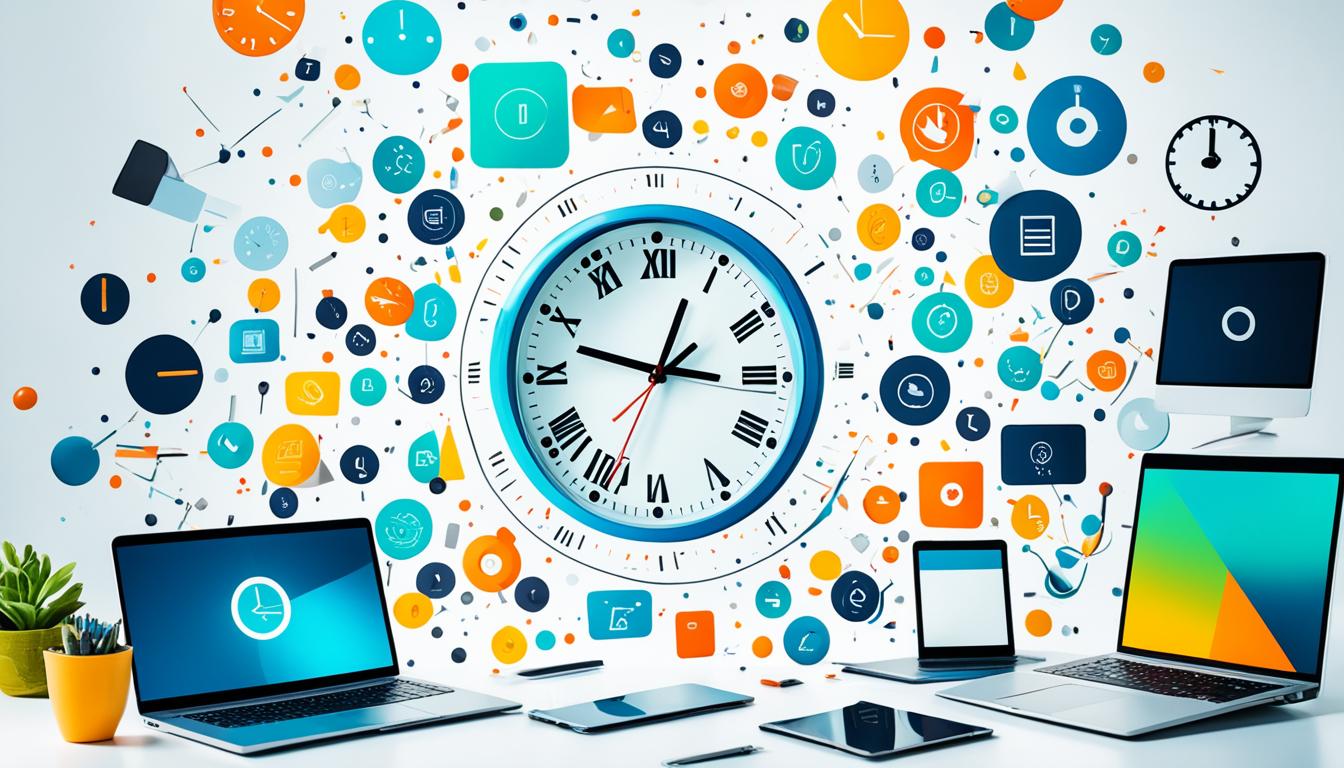Are traditional timekeeping methods hindering the productivity and efficiency of your remote workforce?
In today’s digital age, businesses worldwide are embracing the benefits of remote work. However, managing and tracking the time of employees in dispersed locations can pose significant challenges. It’s essential for businesses to adopt modern timekeeping solutions that address these challenges and optimize the productivity and efficiency of remote workforces.
In this article, we will explore the importance of modern timekeeping solutions for remote workforces and how they can enhance productivity and efficiency. We will delve into the evolution of timekeeping in pandemic-driven work environments and discuss the tools and techniques used to adapt to remote work. Additionally, we will explore the key features of effective time tracking software and the legal aspects of remote timekeeping in the Philippines.
Join us as we uncover the secrets to seamless remote operations, how advanced timekeeping enhances accountability and transparency, and how data-driven decisions can lead to improved productivity for remote teams. We will also showcase case studies of Philippine companies excel with modern timekeeping and highlight the human aspect of timekeeping, focusing on employee well-being.
Key Takeaways:
- Modern timekeeping solutions are crucial for optimizing the productivity and efficiency of remote workforces.
- The pandemic has accelerated the shift towards remote work, necessitating the adoption of new timekeeping tools and techniques.
- Effective time tracking software should integrate with existing systems, have user-friendly interfaces, and provide real-time tracking and reporting capabilities.
- Complying with local labor laws and ensuring accurate timekeeping are essential for protecting employee rights and benefits.
- Modern timekeeping solutions enable businesses to enhance accountability, transparency, and make data-driven decisions for remote teams.
The Evolution of Timekeeping in a Pandemic-Driven Work Environment
In today’s pandemic-driven work environment, businesses have had to adapt to new ways of operating. With the transition to telecommuting becoming the norm, traditional methods of timekeeping have undergone a significant evolution. As companies navigate the challenges of remote work, the need for efficient and accurate time tracking has become more crucial than ever.
Transition to Telecommuting and its Impact on Productivity
The shift to telecommuting has revolutionized the way we work. While remote work provides flexibility and convenience, it also brings unique challenges in tracking employee productivity. Employers need reliable methods to ensure that their teams are working effectively and efficiently, even when they are not physically present in the office. Traditional timekeeping methods, such as punch cards or manual timesheets, are no longer sufficient in the context of remote work.
“As employment setups shifted after the COVID-19 lockdowns, many have awakened to the importance of having the so-called work-life balance, or spending some “me time” at home as much as being in the workplace.” – Alden M. Monzon, Inquirer.net
To address these challenges, companies have turned to modern timekeeping solutions that offer remote work-friendly features. These tools not only track employees’ work hours but also provide insights into their productivity levels and task completion. By adopting these advanced timekeeping technologies, businesses can ensure that their remote teams are accountable for their work and can identify areas for improvement to maintain productivity levels.
Adapting to Remote Work: Tools and Techniques
In order to enhance timekeeping efficiency in a remote work environment, businesses have implemented a range of tools and techniques. These tools are designed to streamline time tracking processes and provide real-time visibility into employees’ work activities.
One such tool is time tracking software, which allows employees to log their work hours and track their tasks effortlessly. This software also provides managers with comprehensive reports on employee productivity, helping them make data-driven decisions to optimize workflow and resource allocation.
Another technique that businesses have adopted is the use of project management platforms. These platforms enable teams to collaborate effectively, assign tasks, and monitor progress in real time. By centralizing communication and task management, these tools promote transparency and accountability, facilitating accurate timekeeping and ensuring that remote work teams stay on track.
Modern Timekeeping Solutions for Seamless Remote Operations
As businesses continue to adapt to remote work environments, the need for modern timekeeping solutions that enable seamless operations has become paramount. These solutions not only streamline workflow processes but also ensure accurate tracking of employees’ work hours, contributing to enhanced productivity and efficiency.
One such solution is time tracking software, which provides businesses with a digital platform to monitor and manage their remote workforce. With time tracking software, employers can effortlessly track employees’ tasks, projects, and time spent on each activity. This allows for better resource allocation, improved project management, and the ability to identify areas where efficiency can be enhanced.
Time tracking software has revolutionized how businesses manage their remote operations. It provides a centralized platform for tracking, recording, and analyzing the time spent on various tasks, giving employers valuable insights into productivity and helping facilitate a seamless workflow.
These modern timekeeping solutions also offer features such as real-time reporting and analytics, allowing employers to monitor work progress and identify any bottlenecks that may be hindering productivity. By having access to real-time data, businesses can make informed decisions and implement necessary adjustments to improve workflow efficiency.
Moreover, modern timekeeping solutions are designed to integrate easily with other tools and platforms that businesses use for remote operations. This seamless integration eliminates the need for manual data entry and reduces the risk of errors, saving both time and effort for employers and employees alike.
By implementing these solutions, businesses can optimize their remote work processes, ensuring that tasks are completed on time and within the allocated resources. This not only boosts overall productivity but also contributes to a more efficient and enjoyable work experience for remote teams.
In summary, modern timekeeping solutions, such as time tracking software, offer a range of benefits for remote operations. They ensure accurate tracking of work hours, streamline workflow processes, provide real-time reporting and analytics, and seamlessly integrate with existing tools and platforms. By adopting these solutions, businesses can achieve seamless remote operations and enhance productivity and efficiency within their remote workforces.
Key Features of Effective Time Tracking Software
When it comes to managing a remote workforce, having effective time tracking software is essential. This section will delve into the key features that make time tracking software a valuable tool for businesses. From integration with existing systems to user-friendly interfaces and real-time tracking and reporting, these features empower organizations to streamline workflows, engage employees, and make data-driven decisions.
Integration with Existing Systems
One of the crucial aspects of effective time tracking software is seamless integration with existing systems. This integration allows for a smooth flow of data and streamlining of processes, eliminating the need for manual data entry and reducing the chances of errors. With integrated time tracking software, businesses can save time, improve accuracy, and enhance overall efficiency in managing remote workforces.
User-Friendly Interfaces: Engaging Filipino Workforces
In the context of the Philippines, engaging Filipino workforces with user-friendly interfaces is vital for successful time tracking. Filipino workers respond well to intuitive and easy-to-use platforms that make their tasks more efficient. By providing a user-friendly interface, time tracking software fosters employee engagement and acceptance, leading to higher productivity and improved time tracking accuracy.
To ensure user-friendliness, effective time tracking software should have clear and visually appealing interfaces, with intuitive navigation and minimal learning curve. It should allow employees to log their time seamlessly and access their time records effortlessly. By prioritizing user experience, businesses can empower their Filipino workforces to embrace time tracking software as a valuable tool in their daily work routine.
Real-Time Tracking and Reporting: Keeping a Finger on the Pulse
Real-time tracking and reporting capabilities are game-changers in remote work environments. With real-time tracking, businesses can monitor the progress of work, identify potential bottlenecks, and make timely adjustments. Whether it’s tracking project hours or monitoring employee productivity, real-time data provides managers with up-to-date insights, enabling them to address issues promptly.
Additionally, real-time reporting allows businesses to generate accurate and comprehensive reports on time utilization, project status, and workforce performance. These reports facilitate data-driven decision-making, strategic resource allocation, and efficient workflow management. By keeping a finger on the pulse of remote operations, businesses can proactively optimize productivity and ensure successful outcomes.
To summarize, effective time tracking software should offer integration with existing systems, user-friendly interfaces that engage Filipino workforces, and real-time tracking and reporting capabilities. By leveraging these key features, businesses can enhance their remote workforce management, increase productivity, and ultimately achieve their goals with confidence and efficiency.
Legal Aspects of Remote Timekeeping in the Philippines
In this section, we will discuss the legal aspects of remote timekeeping in the Philippines. It is vital for businesses to understand the local labor laws and compliance requirements related to time tracking in order to ensure adherence and protect employee rights and benefits. Accurate timekeeping plays a crucial role in maintaining fairness, transparency, and compliance with labor regulations.
Understanding Local Labor Laws and Compliance
When managing a remote workforce in the Philippines, it is essential to be familiar with the labor laws and regulations governing time tracking. These laws outline the rights and protections afforded to employees, ensuring fair treatment and proper compensation.
By understanding the legal requirements, businesses can avoid potential legal complications and penalties associated with non-compliance. This includes aspects such as determining minimum working hours, overtime policies, and rest and meal breaks. Compliance with these laws is crucial to protect both the employer and the employees.
Furthermore, it is important to stay updated on any changes or amendments to labor laws, as regulations may evolve over time. This will help ensure that remote timekeeping practices are aligned with the latest legal requirements.
Ensuring Employee Rights and Benefits with Accurate Timekeeping
Accurate timekeeping is not only necessary for compliance but also for safeguarding employee rights and benefits. Keeping track of employees’ work hours helps prevent wage theft and ensures that employees are compensated fairly for their time and effort.
By implementing accurate timekeeping systems in remote work environments, businesses can confidently demonstrate their commitment to fair labor practices. This fosters trust and collaboration between employers and employees.
Additionally, accurate timekeeping enables businesses to accurately calculate overtime pay, leave entitlements, and other benefits to which employees may be entitled under labor laws. It also supports effective workforce management by providing data-driven insights into productivity and resource allocation.
Overall, adherence to legal requirements and accurate timekeeping not only helps businesses maintain compliance but also creates a fair and transparent work environment where employee rights and benefits are protected.
Enhancing Accountability and Transparency with Advanced Timekeeping
Advanced timekeeping solutions offer businesses the opportunity to enhance accountability and transparency in their remote work environments. By implementing these solutions, companies can improve employee performance, ensure transparency in work processes, and foster a culture of accountability within remote teams.
One of the key benefits of advanced timekeeping is the ability to accurately track and record employees’ work hours. This not only provides employers with valuable data for payroll purposes but also helps to minimize time theft and ensure fair compensation for employees. With advanced timekeeping software, employers can have a real-time overview of their remote workforce’s activities, enabling them to monitor productivity levels effectively.
The Role of Culture in Adoption of Timekeeping Technologies
Culture plays a vital role in the successful adoption of timekeeping technologies within Philippine companies. The culture of accountability and productivity prevalent in many organizations in the Philippines has contributed to the seamless implementation and acceptance of modern timekeeping solutions.
Companies that value transparency and trust among their employees have been more receptive to adopting timekeeping technologies. The emphasis on accuracy, efficiency, and fairness has resulted in a smooth transition to modern timekeeping systems.
Leveraging Geofencing for Secure and Accurate Time Tracking
In remote work environments, ensuring secure and accurate time tracking is crucial for effective workforce management. To achieve this, businesses can leverage geofencing technology. Geofencing allows companies to set virtual boundaries for employee clock-ins and clock-outs, ensuring that they can only be performed from approved locations.
By implementing geofencing, businesses can improve the accuracy of their time tracking data and prevent time theft. Employees will only be able to clock in and out when they are physically present at the specified locations, eliminating the possibility of fraudulent time entries.
Geofencing technology provides an added layer of security to time tracking, ensuring that employees are accountable for their working hours. This not only promotes transparency within the organization but also helps optimize resource allocation and improve overall productivity.
Implementing geofencing for secure and accurate time tracking offers several benefits:
- Prevents time theft by restricting clock-ins and clock-outs to approved locations.
- Improves accuracy of time tracking data by eliminating fraudulent entries.
- Enhances accountability and transparency within the organization.
- Optimizes resource allocation based on real-time location data.
- Increases overall productivity and efficiency of remote workforces.
By leveraging geofencing technology, businesses can ensure that their time tracking processes are secure, accurate, and aligned with the needs of remote work environments. This not only streamlines workforce management but also contributes to the successful implementation of modern timekeeping solutions.
Productivity Insights: Data-Driven Decisions for Remote Teams
In today’s dynamic work landscape, where remote teams are becoming increasingly common, productivity insights and data-driven decisions are crucial for achieving optimal outcomes. With the right timekeeping solutions, businesses can harness valuable data to measure output versus time spent and strategically allocate resources. This section explores the benefits of using time tracking software to drive efficient and effective remote workforce management.
Measuring Output vs Time Spent
Measuring output versus time spent is a key factor in understanding the productivity of remote teams. While traditional timekeeping methods focus solely on hours worked, modern time tracking software provides deeper insights into the actual output generated by employees. By capturing metrics such as completed tasks, project milestones, or key performance indicators (KPIs), businesses can evaluate the true productivity of remote teams and make informed decisions based on concrete data.
Tracking output allows organizations to identify top performers, recognize productivity trends, and uncover opportunities for improvement. By analyzing productivity data in relation to time spent, businesses can identify inefficiencies, optimize workflows, and allocate resources more effectively. This data-driven approach can lead to enhanced performance and increased productivity within remote teams.
Utilizing Time Data for Strategic Resource Allocation
Time data collected through modern timekeeping solutions offers valuable insights that can drive strategic resource allocation. By understanding how employees spend their time, businesses can optimize workloads, balance priorities, and allocate resources more efficiently. This data-driven approach enables organizations to assign tasks to the most suitable team members with the necessary skills and availability, ensuring smoother project execution and improved productivity.
Additionally, time data can help identify bottlenecks or roadblocks in workflows, allowing businesses to address them promptly and optimize processes. By analyzing time data, organizations can identify patterns, trends, and areas for improvement, leading to more streamlined operations and higher productivity levels. With a data-driven approach to resource allocation, businesses can make informed decisions that optimize productivity and achieve better outcomes, even in remote work environments.
| Benefit | Explanation |
|---|---|
| Optimized productivity | By measuring output versus time spent, businesses can identify productivity gaps and implement strategies to enhance overall performance. |
| Efficient resource allocation | Time data enables businesses to allocate resources strategically, optimizing workloads and ensuring tasks are assigned to the most suitable team members. |
| Streamlined workflows | Analyzing time data helps identify bottlenecks, inefficiencies, and areas for improvement, leading to smoother and more efficient workflows. |
| Informed decision-making | By utilizing data-driven insights, businesses can make informed decisions that drive productivity, improve performance, and achieve better outcomes. |
By leveraging productivity insights and making data-driven decisions, businesses can unlock the full potential of their remote teams. Modern timekeeping solutions provide the tools and data necessary to optimize productivity, allocate resources efficiently, and drive successful outcomes in a remote work environment.
The Human Aspect: Timekeeping and Employee Well-being
Employee well-being is a crucial factor to consider when implementing timekeeping solutions in remote work environments. It goes beyond simply tracking hours worked and extends to promoting work-life balance and supporting mental health. In today’s fast-paced digital world, maintaining a healthy work-life balance has become increasingly challenging. Remote work can blur the lines between work and personal life, leading to higher levels of stress and burnout.
By prioritizing employee well-being alongside timekeeping practices, businesses can create a more harmonious and fulfilling work experience for their remote workforce. Modern timekeeping solutions play a crucial role in achieving this balance by providing tools and insights that support employee mental health and work-life balance.
One of the key benefits of effective timekeeping is the ability to accurately track working hours and prevent overwork. This ensures that employees have sufficient time for rest, relaxation, and personal commitments. Clear boundaries between work and personal life are essential for maintaining good mental health and preventing burnout.
Modern timekeeping solutions also offer features that enhance employee well-being by providing reminders for regular breaks and encouraging physical activity. These reminders can help employees stay productive while promoting a healthier and more balanced lifestyle. By incorporating these features into timekeeping practices, businesses can actively support their remote employees’ well-being.
Moreover, timekeeping software can also provide valuable insights into individual work patterns and productivity levels. By analyzing this data, employers can identify potential issues, such as excessive work hours or high levels of stress, and take proactive measures to address them. This data-driven approach not only supports employee well-being but also drives overall productivity and efficiency.
By prioritizing employee well-being and leveraging modern timekeeping solutions, businesses can create a positive remote work environment that fosters work-life balance, promotes mental health, and ultimately leads to a more engaged and productive workforce.
Conclusion
In conclusion, modern timekeeping solutions are essential for businesses with remote workforces. By accurately tracking employees’ work hours, these solutions enhance productivity and efficiency. We have discussed the challenges faced by businesses in remote work environments and the need for effective time tracking tools. It is crucial to choose the right timekeeping solution for your business to ensure seamless remote operations.
Embracing the future of work with confidence and efficiency requires adopting modern timekeeping solutions that align with your business needs. These solutions offer features such as integration with existing systems, user-friendly interfaces, and real-time tracking and reporting. By leveraging geofencing technology, businesses can ensure secure and accurate time tracking.
Furthermore, timekeeping solutions provide valuable productivity insights and enable data-driven decisions for remote teams. By utilizing time data, businesses can measure output versus time spent and strategically allocate resources. Additionally, prioritizing employee well-being in remote work environments is crucial. Modern timekeeping solutions contribute to a healthier work experience by promoting work-life balance and mental health.
It is time to take action and choose the right timekeeping solution for your business. By embracing modern technology, you can navigate the challenges of remote work and unlock the full potential of your workforce. Embrace the future of work with confidence and efficiency by implementing modern timekeeping solutions for your remote workforce.
FAQ
What are modern timekeeping solutions?
Modern timekeeping solutions refer to digital tools and software that enable businesses to track and manage the working hours of their remote workforce efficiently. These solutions automate time tracking processes, provide real-time data, and offer features like geofencing, reporting, and integration with existing systems.
Why are modern timekeeping solutions important for remote workforces?
Modern timekeeping solutions are essential for remote workforces because they help enhance productivity and efficiency. By accurately tracking employees’ work hours, these solutions enable businesses to monitor performance, optimize resource allocation, and ensure fair compensation. They also provide valuable insights into workflow processes and help streamline remote operations.
What challenges do businesses face in remote work environments?
In remote work environments, businesses face challenges such as tracking employees’ productivity, ensuring accurate timekeeping, maintaining accountability and transparency, and complying with local labor laws. These challenges can be effectively addressed by implementing modern timekeeping solutions tailored for remote operations.
How do modern timekeeping solutions improve workforce management and performance?
Modern timekeeping solutions improve workforce management and performance by providing accurate data on employees’ working hours, enabling efficient resource allocation, facilitating transparent communication, and fostering a culture of accountability. These solutions help businesses monitor productivity, identify areas for improvement, and make data-driven decisions.
What features should effective time tracking software have for remote workforces?
Effective time tracking software for remote workforces should have features such as integration with existing systems to streamline processes, user-friendly interfaces that engage employees, and real-time tracking and reporting capabilities. These features ensure seamless time tracking, improve user experience, and provide valuable insights for remote workforce management.
What are the legal aspects of remote timekeeping in the Philippines?
In the Philippines, remote timekeeping must comply with local labor laws, which include regulations regarding working hours, overtime pay, minimum wage, and employee benefits. Accurate timekeeping is crucial to ensure employees’ rights and benefits are protected in remote work environments, as mandated by the Philippine labor laws.
How can advanced timekeeping solutions enhance accountability and transparency in remote work environments?
Advanced timekeeping solutions enhance accountability and transparency in remote work environments by providing real-time data on employees’ working hours, ensuring fair compensation, and facilitating transparent communication between employees and employers. These solutions promote responsible behavior, foster trust, and enable effective remote team management.
How does geofencing technology contribute to secure and accurate time tracking in remote work environments?
Geofencing technology contributes to secure and accurate time tracking in remote work environments by establishing virtual boundaries around approved locations. This technology ensures that employees can only clock in and out from authorized places, preventing time theft and ensuring the accuracy of time tracking data. Geofencing enhances security and provides businesses with reliable information for workforce management.
How can modern timekeeping solutions provide productivity insights and enable data-driven decisions for remote teams?
Modern timekeeping solutions provide productivity insights and enable data-driven decisions for remote teams by measuring output versus time spent. They help businesses identify high-performing employees, allocate resources efficiently, and measure the effectiveness of different strategies. Time tracking software also enables businesses to utilize time data for strategic resource allocation, enhancing productivity and driving better outcomes for remote teams.
How does timekeeping impact employee well-being in remote work environments?
Timekeeping plays an essential role in reducing employee burnout, promoting work-life balance, and supporting mental health in remote work environments. Accurate time tracking allows employees to have defined working hours and helps prevent overwork. Modern timekeeping solutions can contribute to a healthier and more fulfilling work experience by ensuring fair compensation, providing clear boundaries, and facilitating efficient remote workforce management.
How can businesses choose the right timekeeping solution for their remote workforces?
To choose the right timekeeping solution for their remote workforces, businesses should consider factors such as their specific needs, the features offered by different solutions, ease of integration with existing systems, scalability, and user-friendliness. It’s important to select a timekeeping solution that aligns with the organization’s goals, enhances productivity and efficiency, and provides an optimal user experience.
What are the benefits of embracing the future of work with modern timekeeping solutions?
Embracing the future of work with modern timekeeping solutions offers businesses the benefits of increased productivity, improved workforce management, enhanced transparency, and better decision-making based on data insights. These solutions enable companies to adapt to the changing work landscape, boost efficiency, and confidently embrace the advantages of remote work while ensuring fair compensation and promoting employee well-being.





